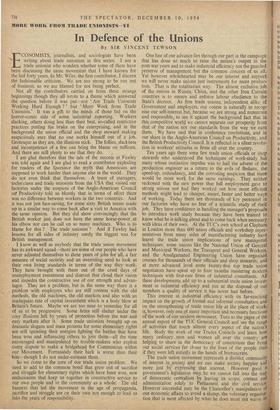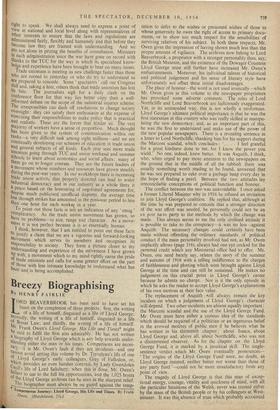MORE WORK FROM TRADE UNIONISTS-11'11
In Defence of the Unions
By SIR VINCENT TEWSON CONOMISTS, journalists, and sociologists have been
•
writing about trade unionism in this series. I am a trade unionist who wonders whether some of them have been discussing the same movement that I have known for the last forty years. In Mr. Wi!es, the first contributor, I discern the fashionable criticism. We are too strong to be run out of business, so we are blamed for not being perfect. Not all the contributors carried on from these strange beginnings though they all wrote to a theme which answered the question before it was put—not 'Are Trade Unionists Working Hard Enough ? ' but 'More Work from Trade Unionists.' It was a gift to the minds of those fed on the horror-comic side of some industrial reporting. Workers slacking, others doing less than their best, so-called restrictive practices putting the brake on the enterprising, and in the background the union official and the shop steward making suspiciously sure that no one works himself out of a job. Grotesque as they are, the illusions stick. The follies, slackness and incompetence of a few can bring the blame on millions. And there are still plenty to see that they do. , I am glad therefore that the tale of the success at Fawley was told again and I am glad to read a contributor exploding for readers of the Spectator the myth that Americans are supposed to work harder than anyone else in the world. They do not even think that themselves. A team of managers, techn:cians and trade unionists from the USA that visited our factories under the auspices of the Anglo-American Council oil Productivity told us bluntly that in terms of effort there was no difference between workers in the two conntries. And it was not just face-saving, for some sixty British teams made up in a similar way to come back after a visit to America with the same opinion. But they did show convincingly that the British worker just does not have the same horse-power , at his elbow nor can he call on so many machines. Who is to blame for this ? The trade unionist ? And if Fawley had lessons for all sides of industry surely the biggest was for British management.
I know as well as anybody that the trade union Movement has its awkward squad—there are some of our people who have never adjusted themselves to these years of jobs for all, a fair measure of social security and an overriding need to look at their own living standards in terms of the way they work.
They have brought with them out of the cruel days of unemployment resentment and distrust that cloud their vision and impedes the constructive use of our strength and advan- tages. They are a problem. but in the same way there is a problem with employers who are still content with the old methods, the old machines, the old markets and also with an inadequate rate of capital investment which is a body blow at Britain's future. Maybe we are too near to yesterday for all of us to be progressive. Some firms still shelter under the cosy illusions left by years of protection before the war and easy markets after it. Some trade unionists brought up on dramatic slogans and mass protests for some elementary rights are still spending their energies fighting the battles that have been won and influencing others to join them—all the time encouraged and-manipulated by trouble-makers who exploit every dispute-to make a bridgehead for Communism within our Movement. Fortunately their bark is worse than their bite—though I do not under-estimate them.
So we dome to the core of our trade union problem. We need to add to the common bond that grew out of sacrifice and struggle for elementary rights which have been won, new enthusiasms that keep us together in constructive service to our own people and to the community as a whole. The old banners that led the movement in the age of propaganda, sacrifice and struggle are on their own not enough to lead us into the years of responsibility. One line of our advance lies through our part in the campaign that has done so much to raise the nation's output in the post-war years and to make industrial efficiency not the guarded preserve of management but the common concern of us all. Yet however wholehearted may be our interest and support we will never make unions just instruments for more produc- tion. That is the totalitarian way. The almost exclusive job of the unions in Russia, China, and the other Iron Curtain countries is to ensure and enforce labour obedience to the State's decrees. As free trade unions, independent alike of Government and employers, our course is naturally to recog- nise our self-interest but, because we are strong and numerous and responsible, to see it against the background fact that in this competitive world we cannot separate our prosperity front that of the nation nor our standards from the way we earn them. We have said that in conference resolutions, and in our share in the Anglo-American Council on Productivity, and the British Productivity Council. It is reflected in a silent revolu- tion in workers' attitudes in firms all over the country. Ten years ago there were few trade union officials or shop stewards who understood the techniques of work-study but many whose instinctive impulse was to hail the advent of the production engineer as a return to the evils of Bedaux, the speed-up, redundancy, and the corroding suspicion that there would be more work for the same earnings. They neither reckoned with the new power that full employment gave to strong unions nor had they worked out how more efficient methods might lead to cheaper, easier, faster and better ways of working. Today there are thousands of key personnel in our factories who have no fear of a scientific study of their job. They have confidence in handling the manager's proposals to introduce work study because they have been trained to know what he is talking about and to come back when necessary with ideas of their own. At the TUC's own school at Clapham in London more than 600 union officials and workshop repre- sentatives from many sides of manufacturing industry have learnt the trade union implications of new managerial techniques; some unions like the National Union of General and Municipal Workers, the Transport and General Workers. and the Amalgamated Engineering Union have organised courses for thousands of their officials and shop stewards; and at more advanced level some twenty-five top trade union negotiators have spent up to four months mastering modern techniques with first-rate firms of industrial consultants. All these developments add up to a substantial trade union invest- ment in industrial efficiency and put at the disposal of our members a quality of service it has never had before.
This interest in industrial efficiency with its far-reaching impact on the growth of formal and informal consultation and on the strengthening of trade union life at the place of work. is, however, only one of many important and necessary functions of the work of our modern movement. Turn to the pages of the annual report of the TUC General Council and see the range of activities that touch almost every aspect of the nation's life. Study the work of our Trades Councils and learn hoof many ordinary men and women all over the country are helping to share in the democracy of committees that bring our social services far closer to the lives of the people than if they were left entirely in the hands of bureaucrats.
The trade union movement represents a distinct communitY of interest in society and we can make society happier and more just by expressing that interest. However good a government's legislation may be we cannot fall into the trail of democratic centralism by leaving its scope, content and administration solely to Parliament and the civil service. However successful may be the Chancellor's manipulation of our economic affairs to avoid a slump, the voluntary organis.a• tion that is most affected by what he does must not waive gilt to speak. We shall always need to express a point of
View at national and local level along with representatives of Other interests to ensure that the laws and regulations are administered fairly, flexibly and humanely and that before they become law they are framed with understanding. And we tire not alone in prizing the benefits of consultation. Ministers in each adn3inistration since the war have gone on record with thanks to the TUC for the way in which its specialised know- ledge and experience have been brought to bear on many issues. Trade unionism is meeting its new challenge faster than those Who are rooted to yesterday or who do try to understand us are prepared to concede. Some spectators call our Congress dull and, taking a hint, others think that trade unionism has lost its bite. The journalists sigh for a daily clash on the
. conference floor for that way lies better cOpy than a well- , informed debate on the scope of the industrial injuries scheme. The irresponsibles can dash off resolutions to change society Overnight: they can satisfy their enthusiasm at the expense of exercising their responsibilities to make policy that is practical and realistic. These are the forces that hinder us. The vast majority of workers have a sense of proportion. Much thought has been given to the system of communication within our ranks—a Very difficult task among eight millions—and we are continually developing our schemes of education in trade union and general subjects of all kinds. Each year sees more trade unionists going through TUC and union weekend and summer schools to learn about economics and social affairs: many of them go on to longer courses. They are the future leaders of a movement whose numbers and resources have grown steadily during the post-war years. In our workshops there is increasing trade union activity that properly directed can lead to wider industrial democracy and in our industry as a whole there is a peace based on the honouring of negotiated agreements for. despite much publicised unofficial disputes. the average time lost through strikes has amounted in the post•war period to less than one hour for each workei in a year.
To point out these facts is not an indication of any 'smug' complacency. As the trade union movement has grown, so have its problems—in size, range and character. As a move- Ment it is not perfect because it is so essentially human.
I think, however. that I am entitled to point out these facts to justify a claim that we are a vigorous and forward-looking Movement which serves its members and recognises its responsibility to society. They form a picture closer to my understanding and experience of the movement I have grown uP with, a movement which to my mind rightly earns the pride of trade unionists and calls for some greater effort on the part of those with less intimate knowledge to understand what has been and is being accomplished.









































 Previous page
Previous page